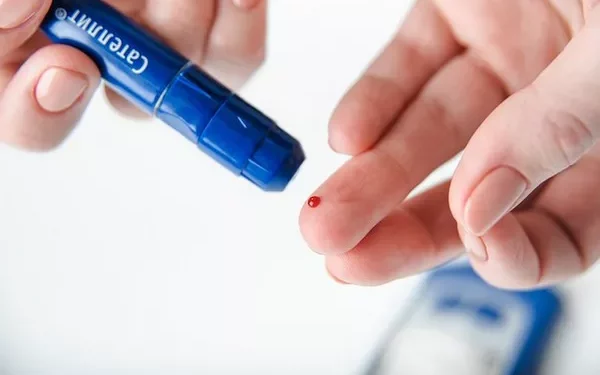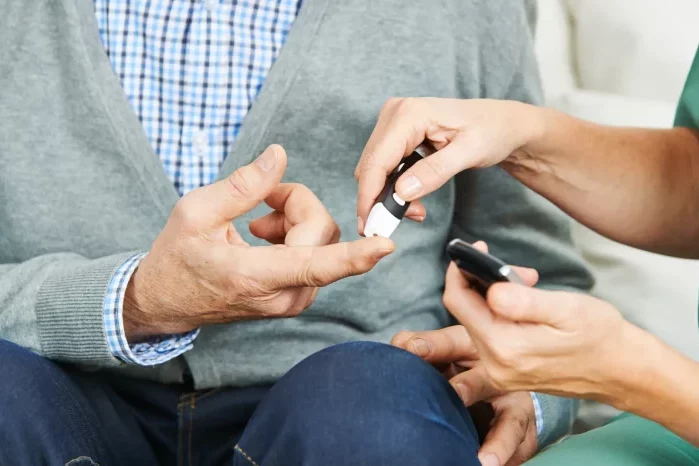Blood sugar, or blood glucose, is the main type of sugar found in the blood and is the primary source of energy for the body’s cells. It comes from the foods we eat and is regulated by insulin, a hormone produced by the pancreas. Maintaining proper blood sugar levels is crucial for overall health, particularly for individuals with diabetes. Managing blood sugar is not only about preventing immediate complications like hyperglycemia (high blood sugar) and hypoglycemia (low blood sugar) but also about averting long-term health issues.
Why Managing Blood Sugar is Crucial
Preventing Short-term Complications
Hyperglycemia occurs when blood glucose levels are too high. If untreated, it can lead to serious conditions such as diabetic ketoacidosis (DKA) in type 1 diabetes or hyperosmolar hyperglycemic state (HHS) in type 2 diabetes. Both conditions require immediate medical attention and can be life-threatening. Symptoms of hyperglycemia include frequent urination, increased thirst, and high levels of glucose in the urine.
Hypoglycemia happens when blood glucose levels drop too low. This can cause symptoms such as shaking, sweating, confusion, irritability, dizziness, and, in severe cases, loss of consciousness or seizures. Quick management with fast-acting carbohydrates (like glucose tablets or juice) is essential to prevent serious outcomes.
Reducing the Risk of Long-term Complications
Chronic hyperglycemia, even if not severe, can lead to long-term complications that significantly impact quality of life and longevity. These include:
Cardiovascular Disease: High blood sugar levels can damage blood vessels and nerves, increasing the risk of cardiovascular diseases such as heart attack, stroke, and hypertension.
Neuropathy: Persistent high glucose can damage nerves, particularly in the extremities, leading to diabetic neuropathy. This can cause pain, tingling, and loss of sensation in the feet and hands, potentially leading to severe infections and amputations.
Nephropathy: The kidneys filter waste from the blood, and high glucose levels can damage this filtering system. Diabetic nephropathy can lead to chronic kidney disease and, eventually, kidney failure requiring dialysis or transplantation.
Retinopathy: High blood sugar levels can damage the blood vessels in the retina, leading to diabetic retinopathy, a leading cause of blindness in adults. Regular eye exams and good blood sugar control can prevent or slow its progression.
Foot Problems: Poor blood flow and nerve damage in the feet can lead to foot ulcers and infections. In severe cases, this can result in amputations.
Strategies for Managing Blood Sugar Levels
Effective blood sugar management involves a combination of lifestyle changes, regular monitoring, and medication when necessary. Here are some key strategies:
Healthy Eating
Diet plays a pivotal role in managing blood sugar levels. Key dietary recommendations include:
Balanced Meals: Consuming a balanced diet rich in vegetables, fruits, whole grains, lean proteins, and healthy fats can help maintain stable blood sugar levels. It’s important to include fiber-rich foods that slow the absorption of glucose.
Carbohydrate Counting: Understanding how different carbohydrates affect blood sugar is crucial. Carbohydrate counting helps individuals manage their intake and maintain better control over their blood sugar levels.
Portion Control: Eating in moderation and being mindful of portion sizes can prevent spikes in blood sugar levels.
Regular Meal Timing: Eating meals and snacks at consistent times can help regulate blood sugar levels.
Regular Physical Activity
Exercise helps improve insulin sensitivity, allowing cells to use available insulin more effectively to absorb glucose from the bloodstream. Recommendations include:
Aerobic Exercise: Activities like walking, swimming, or cycling can help lower blood sugar levels and improve cardiovascular health.
Strength Training: Building muscle through resistance exercises can improve insulin sensitivity and glucose uptake.
Consistency: Regular physical activity, spread throughout the week, offers the best benefits for blood sugar management.
Monitoring Blood Sugar Levels
Regular monitoring provides valuable information about how different foods, activities, and medications affect blood sugar levels. Monitoring methods include:
Self-Monitoring of Blood Glucose (SMBG): Using a glucose meter to check blood sugar levels at home helps individuals make informed decisions about their diet, exercise, and medication.
Continuous Glucose Monitoring (CGM): CGM systems provide real-time blood sugar readings throughout the day and night, helping to identify patterns and trends that can inform treatment adjustments.
A1C Testing: The A1C test measures average blood sugar levels over the past 2-3 months. It is a key indicator of long-term blood sugar control.
Medication Management
For many individuals with diabetes, medication is a critical component of blood sugar management. This can include:
Insulin Therapy: Required for individuals with type 1 diabetes and some with type 2 diabetes. Different types of insulin (rapid-acting, long-acting) are used to mimic the body’s natural insulin response.
Oral Medications: Various oral medications can help manage blood sugar levels by improving insulin sensitivity, increasing insulin production, or reducing glucose production by the liver.
Injectable Medications: Non-insulin injectables, such as GLP-1 receptor agonists, can help regulate blood sugar levels and support weight loss.
Stress Management
Stress can significantly impact blood sugar levels. Effective stress management techniques include:
Mindfulness and Meditation: Practices like mindfulness and meditation can help reduce stress and improve emotional well-being.
Physical Activity: Regular exercise can also help reduce stress levels.
Adequate Sleep: Ensuring sufficient and quality sleep is crucial for overall health and can help manage stress and blood sugar levels.
The Role of Healthcare Providers
Healthcare providers play an essential role in managing blood sugar levels. Regular check-ups with a diabetes care team, including doctors, dietitians, and diabetes educators, can provide personalized advice and support. Key components of healthcare provider involvement include:
Individualized Care Plans
Creating individualized care plans that consider the unique needs and lifestyle of each person with diabetes can improve adherence to management strategies and outcomes. These plans often include:
Dietary Recommendations: Personalized nutrition plans that take into account individual preferences, cultural considerations, and nutritional needs.
Exercise Guidelines: Tailored exercise recommendations that suit the individual’s fitness level and preferences.
Medication Management: Regular reviews of medication regimens to ensure optimal blood sugar control and minimize side effects.
Education and Support
Educating individuals about diabetes management and providing ongoing support is crucial for successful blood sugar control. This includes:
Diabetes Education Programs: Structured programs that teach essential skills for managing diabetes, including carbohydrate counting, insulin administration, and blood sugar monitoring.
Support Groups: Connecting with others who have diabetes can provide emotional support and practical tips for managing the condition.
Regular Monitoring and Adjustments
Regular follow-ups with healthcare providers are essential for monitoring progress and making necessary adjustments to the management plan. This includes:
A1C Testing: Periodic A1C tests to evaluate long-term blood sugar control and adjust treatment plans as needed.
Routine Check-ups: Regular visits to assess overall health, screen for complications, and address any concerns.
Technological Advances in Blood Sugar Management
Advancements in technology have significantly improved the tools available for managing blood sugar levels. Some notable innovations include:
Continuous Glucose Monitors (CGMs)
CGMs provide real-time glucose readings, alerting users to high or low blood sugar levels and helping to identify patterns and trends. They offer a more comprehensive view of glucose levels than traditional fingerstick testing.
Insulin Pumps
Insulin pumps deliver continuous insulin therapy, mimicking the body’s natural insulin release. They can be programmed to deliver basal insulin throughout the day and bolus insulin at mealtimes, offering greater flexibility and control.
Automated Insulin Delivery Systems
Also known as artificial pancreas systems, these devices combine CGMs and insulin pumps with sophisticated algorithms to automate insulin delivery. They adjust insulin doses based on real-time glucose readings, reducing the burden of diabetes management and improving outcomes.
Mobile Apps and Digital Health Platforms
Mobile apps and digital health platforms can help individuals track their blood sugar levels, diet, exercise, and medication. They often include features like reminders, data analysis, and educational resources, supporting better self-management.
See also: What Should My Blood Sugar Be When I Wake Up?
Conclusion
Managing blood sugar levels is crucial for preventing both short-term and long-term complications of diabetes. Through a combination of healthy eating, regular physical activity, monitoring, medication, and stress management, individuals can achieve better blood sugar control and improve their overall quality of life. Advances in technology and the support of healthcare providers further enhance the ability to manage blood sugar effectively. By prioritizing blood sugar management, individuals with diabetes can reduce the risk of complications, maintain their health, and enjoy a better quality of life.
Related topics:
Is Blood Sugar Monitoring Without Diabetes Worthwhile?


























